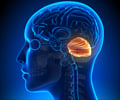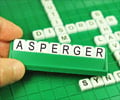Dyslexia a most common learning disorder, affects nearly one in 24 people. People with dyslexia often have great difficulty learning to read, write and spell. Dyslexia was found to have been linked to reduced activity in the cerebellum of the brain that controls movement, co-ordination and balance, scientists have reported.
The research, which was led by Professor Roderick Nicolson, compared the brain activity of eight normal and eight dyslexic adults using a scanning technique called positron emission tomography (PET). patients were monitored as they performed a pre-learned sequence of right hand finger movements, and as they learned a new sequence of finger movements, also with their right hand.During the tasks, activation of the cerebellum in the dyslexic individuals was only about 12% of that in the other persons. When learning the new sequence, the dyslexics' brains were significantly less active in the area of the right cerebellum. Both the right cerebellar cortex and part of the cerebral cortex were less active when they performed the pre-learned sequences.
Evidence has emerged recently that as well as having language problems, dyslexic children often face difficulties with rapid information processing, co-ordination, balance and fluency. The researchers said other parts of the brain may also be involved, but the findings indicated "strongly" that the cerebellum was a key structure affected in dyslexia.










